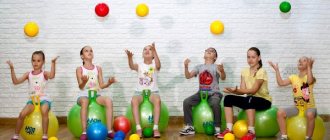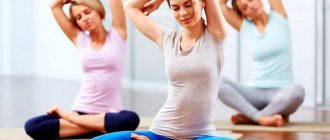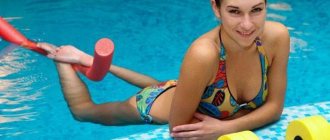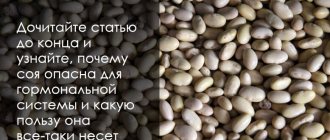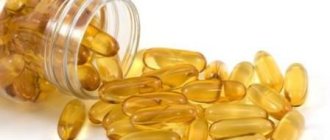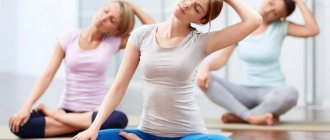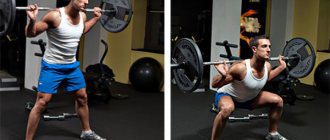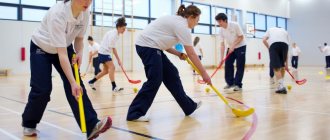Does physical exercise affect our body and, accordingly, our health? I think those who actively use them in their lives will answer in the affirmative and give their own examples of their positive influence.
Can exercise harm us, and in what cases? You can also say “Yes” to this question and cite situations and conditions for their negative impact on our health.
Let's talk a little about the effect of physical exercise on our body. I am sure that those who still doubt about doing them regularly will include them in their daily lives and significantly strengthen their immunity and health.
Main types of exercise
To understand the essence of physical exercises, you can take their definition in Wikipedia - “Physical exercises are elementary movements, motor actions composed of them and their complexes, systematized for the purpose of physical development.”
That is, from individual movements that we perform naturally and without thinking about it, we can create complexes (systems) of exercises that help improve the performance of the body and our health.
Let's see what general types of exercises exist so that we can select the necessary ones to strengthen our health:
- Exercises to increase endurance (they are also called cardio exercises) are dynamic workouts that increase endurance, heart training, and promote weight loss. They can be fast walking, swimming, cross-country skiing, running at an average pace for medium and long distances, dancing, cycling.
These exercises are usually performed with intense breathing, so oxygen is the main source of energy. Such a load is considered aerobic (energy source is oxygen) if it lasts at least 20 minutes, but preferably no more than one hour.
- Flexibility (or stretching) exercises - to a greater extent, these are static loads that are aimed at improving the flexibility of the body, increasing the mobility of joints, for example: stretching various muscles of the body, bending with maximum amplitude, turns, compression and stretching of the spine (a good example is sets of yoga exercises). After such exercises, more oxygen reaches the muscles, the person has good control of the body, and correctly distributes the external load on the joints and muscles. The good thing about such exercises is that they don’t take up much time or space.
- Strength exercises (or athletic) - they are aimed at increasing muscle strength, for example: lifting a barbell, working on weight machines, pull-ups, squats, push-ups, etc. Performed quickly, intensively, in several approaches. Respiration here is mainly anaerobic (energy is extracted from the muscles).
To summarize, all exercises can be divided into two large groups - dynamic and static. From their combination, various sets of exercises are created that support the body and have a positive effect on overall health.
What is physical education
Physical education is the cultivation of body culture through physical activity and gymnastics. It develops not only the body, but also the human nervous system. Loads on the body help normalize the activity of the mental system. This is especially important for children, because they absorb huge flows of information every day. Sport helps the brain relieve stress and restore clarity to the head.
Physical education can be therapeutic and adaptive. Therapeutic exercise helps restore the human body to some functions that were damaged during injury or serious psychological shock. Adaptive physical education is applicable for people who have developmental disabilities.
The effect of exercise on body systems
Various sets of exercises affect almost all body systems (consisting of organs and united to perform certain functions). If you exercise regularly and correctly, the metabolic processes of substances and energy are activated in our body, its protective functions are strengthened, endurance increases, and psycho-emotional stability increases.
Let's go through the main systems and see what each of them gains from such “influence”:
- The cardiovascular system pumps blood and delivers it to all organs of the body.
During endurance training:
- The pulse rate increases, the performance of the heart increases, oxygen enters the blood in large volumes;
- the vessels become elastic, and blood is transported more easily through them. Blood pressure returns to normal. Possible jumps quickly return to their original values. Increases endurance of the heart muscle;
- Thanks to scientific research, it has already been reliably proven that regular exercise greatly reduces the risk of atherosclerosis and reduces the resting heart rate, which allows the heart to save its resources, and this prolongs its life.
Author's experience
Vladimir Ekimov
Develops industrial automation systems. Creates websites. Writes articles and books. Healthy lifestyle experience over 12 years
Ask a Question
True! About five years ago, unexpectedly for me, my pulse became lower than usual. I trained intensively before this for about a year and a half. Now I’m trying to maintain the body’s condition at the same level of performance.
- The circulatory system delivers oxygen and nutrients to the organs and tissues of the human body and removes waste products and carbon dioxide from them. Regulates the activity of the body, protects it from foreign microorganisms, ensures blood clotting in case of tissue damage.
During periodic physical education:
- the oxygen capacity of the blood increases due to more red blood cells in the blood;
- due to the increased activity of leukocytes, the body's resistance to infectious and colds increases;
- blood acquires the ability to quickly recover after significant losses.
- Respiratory system - captures oxygen from the inhaled air and releases carbon dioxide into the external environment. Further, oxygen passes from the blood to tissues and cells, where it participates in chemical oxidation reactions. The resulting carbon dioxide, during biochemical reactions, is removed from the body.
The effects of physical education on the respiratory system are as follows:
- the enrichment of blood with oxygen increases due to an increase in lung volume;
- The respiratory rate decreases to 8-12 times per minute, its depth increases, and pulmonary ventilation increases to 120-130 l/min. during physical activity;
- The body's maximum oxygen consumption per minute increases during muscle work. For an ordinary person, this figure is 2 - 3 l./min., for those who train, it can reach up to 5-6 l./min.
- The musculoskeletal system (musculoskeletal system) creates stable support for the body in static poses, and has every opportunity for its movement and performing dynamic exercises. It also plays a protective role for body organs and is involved in mineral metabolism and hematopoiesis. It includes two main systems - bone and muscle.
How training affects the musculoskeletal system is given below:
- First of all, the strength and size of muscles increases. Due to the flow of blood to the muscles, the ability to control them by the nervous system improves, and the muscle mass increases (indeed, fitness centers and gyms clearly demonstrate this);
- the consequence of regular training is an increase in a person’s endurance and performance;
- sets of exercises help strengthen bones and their resistance to stress and injury;
- Strong muscles allow you to develop good posture, with more efficient performance of the main functions of this system - support, movement and coordination of the body.
- The nervous system is the main regulator of the activity of all systems in the body, uniting and coordinating their normal functioning. Also, a person’s mental activity, his behavior, is carried out with the direct participation of the nervous system.
Regular physical exercise has the following effects on the nervous system:
- human nervous activity is activated and improved with a noticeable increase in blood supply to the brain;
- Nervous processes are balanced due to the normalization of the processes of excitation and inhibition, which constitute the physiological basis of brain activity;
- the possibilities for various diseases are reduced by strengthening the body’s defenses;
- the psyche becomes more resistant to various kinds of unfavorable factors. Good sleep, increased calm, increased self-control, ability to better cope with depression. Scientists have found that the stability of perception, attention, and memory are directly dependent on regular exercise.
- Immune system – protects the body from harmful and foreign factors. From the above data it is clear that with regular exercise, the capabilities of the immune system increase significantly.
- The reproductive system is the most complex system of the body, responsible for sexual function and, in general, for the continuation of the human race. It has been found that regular exercise has a significant healing effect on the sexual function of men and women. (Together with the nervous system and a stable psyche, the effect is very noticeable, it has been tested many times).
Of course, there are more systems in the body, but I think an analysis of these main ones gives a stable picture that the body simply needs regular physical training. The optimal duration of intensive health exercises should be 20-60 minutes, 2-3 times a week.
Our body is a complex bioenergetic system that performs all the vital functions we need:
- first of all, obtaining different types of energy (thermal, mechanical, bioelectric, etc.) in the process of breaking down the necessary nutrients supplied with food;
- nutrition, construction and replacement of cells in human tissues and organs;
- recycling and removal of unused or waste substances from the body. Cleansing the internal space of the body from the toxins formed in the process of breakdown and metabolism of substances and energy.
And this happens 24 hours a day. Even during sleep or rest, the body restores order in its bins. As we can see, the main source of energy for our body is the exchange and breakdown of nutrients.
Can we support him in this difficult and urgently needed task? Certainly!
This is also the implementation of sets of various exercises that help strengthen metabolic processes through training and maintaining in tone those internal mechanisms that carry out these processes. That is, here too, physical education plays a positive role for our health.
The health benefits and harms of exercise
The benefits of physical exercise for the body are obvious, based on the above data on their effect on the body as a whole. But we should not forget that just like a coin has two sides, so here there is a flip side to such training.
Let's see what harm and when exercise can cause to our health in order to understand our capabilities and limits:
- firstly, if you decide to work out seriously and regularly in the gym, then you simply need to understand the state of your health at this moment. Especially if you didn’t spend a lot of time on such activities, and if they were, they were one-time, non-permanent. It is best to undergo an examination and consult a doctor about the possibility of such training. Then you will know what loads you can start with and the timing of their gradual increase;
- if you haven’t done this and haven’t calculated the load, and you have health problems, for example with the cardiovascular system, then training can lead to a deterioration in heart activity. You will get the opposite effect instead of the expected one;
- You can undoubtedly cause harm to your health if you start exercising immediately after an illness. It is necessary to pause to allow the body's functions to recover. Then everything will go fine, and the training will have its positive effect;
- you may not calculate your strengths and capabilities, and as a result of a long or very intense workout, a sharp decline will occur. In such a situation, you may feel not only physical fatigue, but also mental depression, poor health, and sometimes there is a complete aversion to this kind of activity. This is very reminiscent of physical and nervous exhaustion, and it is quite possible that you will have to see a doctor. But basically there is nothing terrible about it, you just need to give yourself time to rest, restore your strength and psyche;
- Another option is when you suddenly started working out often and a lot, and before that you didn’t go to the gym at all. There is a high probability of harm to health here. It is necessary to increase the load gradually, and initially, preferably under the guidance of a trainer, which is available in any fitness room.
Sports in children's lives
Sport occupies a special place in the lives of children and adolescents. It is necessary not only for the harmonious development of the body, but also for creating a sense of discipline. Sports instill in children such qualities as willpower, perseverance, and restraint. These character traits, acquired from childhood, will accompany a person throughout his entire life.
It has long been proven that people involved in sports activities are much more likely to achieve success. This fact is explained by three reasons:
1. Health.
Sport improves and strengthens health. People who play sports have more strength and energy, which is necessary to work in any field.
2. Strong-willed qualities.
As has already been said, sport educates a person. It makes him persistent and attentive.
3. Psychological release.
Physical education is a great way to combat stress. Usually people tend to accumulate negative emotions in themselves, while the sports society always knows where to throw out the accumulated emotional load. This protects mental health, increases stress resistance and productivity in resolving conflict situations.

